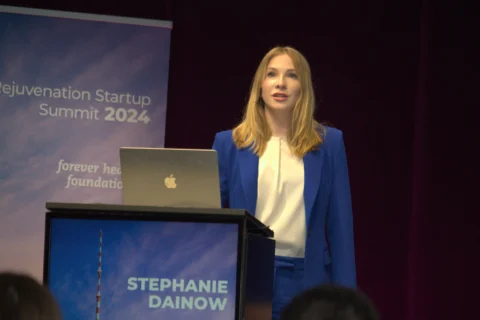
Organization Description
Junevity is a preclinical-stage biotechnology company focused on making aged cells biologically younger.
The co-founder and CEO is John Hoekman, PhD. He is also the founder and CEO of Impel Pharma, which makes the migraine drug Trudhesa. The scientific founder and chief scientific officer is Janine Sengstack, PhD.
Making old cells young again
The company is developing an approach called “cell reset.” that uses long-lasting silencing RNA (siRNA). It targets transcription factors to fight age-related changes in gene activity.
The company believes these epigenetic alterations are one of the reasons we age. The goal is to reverse these harmful alterations to prevent age-related diseases.
Cellular reprogramming
The approach was inspired by Shinya Yamanaka’s Nobel Prize-winning work on cellular reprogramming. His approach uses a specific mix of transcription factors to reverse some epigenetic changes in a cell. These changes define the cell’s identity, like those of a liver or heart muscle cell. This treatment changes mature cells of a specific type back into a state similar to embryonic stem cells.
These transcription factors are known as the Yamanaka Factors. It is possible to reprogram cells using just four master genes: Oct4, Sox2, Klf4, and c-Myc (OSKM).
Previously, it was believed that egg cells, also known as oocytes, had many complex elements. These elements were thought to be necessary for turning a regular cell into an embryonic cell. The scientific community believed that making a new organism from an old egg cell involved hundreds of factors.
However, Takahashi revolutionized this notion by demonstrating that only these four factors were sufficient for this transformation to occur. In other words, the creation of a new human being was not as complex as believed and OSKM could do it all.
Also most interesting of all was that aged cells exposed to OSKM became biologically younger. In fact so complete was the change that the cells were indistinguishable from their younger counterparts.
But there was a problem with cellular reprogramming. Cells exposed to OSKM for too long would completely forget what they were. This is a problem if you have a liver cell suddenly forgetting its identity.
This led to the next step in reprogramming cells.
Partial cellular reprogramming
Juan Carlos Izpisua and others showed that short treatments with OSKM can remove harmful epigenetic alterations in aging cells. This helps restore youthful function while keeping the cells’ identity.
Many longevity biotech companies have subsequently been founded to pursue partial reprogramming. Some are using the original OSKM factors, others are exploring using only some or even other factors.
However, partial cellular reprogramming is not without its potential risks. Too much exposure to the factors may erase the cell’s identity. This then carries the risk of tumor formation, in particular teratomas. This is a rare type of cell tumor that may contain immature or fully formed tissue, including teeth, hair, bone and muscle.
Refining partial cellular reprogramming
Sengstack’s PhD project at UCSF sought to “reset” the dysfunctional transcriptional pattern of aging or diseased cells. Using large-scale transcriptomics data and machine learning they identified gene expression pathways that become overactive in these cells.
Finally, they identified factors unrelated to development that drive these abnormal patterns. These factors could be used to normalize the cell’s transcriptional pattern and its function without compromising cellular identity.
Using these factors also reduces the potential risks the master OSKM factors carry. Juvenity has also changed its siRNA candidates to make them resistant to breakdown by nucleases and other factors.
And because its therapies are siRNA based, they could be administered once every 3-12 months rather than a daily pill. This may serve to increase patient compliance rates.
Sengstack has said they can direct their therapies to specific tissues. For example, they use GalNAc conjugation to target liver cells. This is in addition to its other previously mentioned advantages.
Drug development pipeline
While there is broad application for the siRNA approach, initially the focus is on diabetes and obesity.
Type II Diabetes and Obesity
In February 2025, Juvenity announced its first siRNA therapy. This treatment improved glucose control and insulin sensitivity in diabetic mice. It did this without causing weight gain or other side effects linked to insulin sensitizers.
In obesity, Junevity’s second siRNA candidate improved adipose tissue metabolism and reduced food intake. This resulted in a 30% weight loss versus controls. Importantly, this weight loss was driven by fat loss with retention of lean mass.”
In an interview, Sengstack described animal studies that used models of diabetes and obesity.
She said “so many things go back to a healthy mouse state. We see decreases in things like stress response and inflammation, one of the key hallmarks of aging. We see improvements in mitochondria and fat metabolism as well.”
She continued, “All of those pieces together add up to a healthier overall mouse, which I would argue is leading towards a resetting of the metabolism to a younger, healthier state.” Additionally, she said, “We have some really exciting mouse data where they lose tons of fat but they don’t lose any muscle.”
In February 2025, Juvenity announced that it had raised $10 million in seed funding. The round was led by Goldcrest Capital and Godfrey Capital.
December 4, 2025 saw them doubling their seed financing to $20 million to test a drug to help patients maintain long-term weight loss. Competitors are focused on GLP-1 and GIP receptors to suppress appetite, but Junevity is taking a different approach.
Rather than suppressing hunger, Junevity focuses on enhancing calorie burning for patients. The medication, anticipated to be administered biannually, targets a particular, undisclosed gene to boost metabolic efficiency.
Related Topics

Read More




